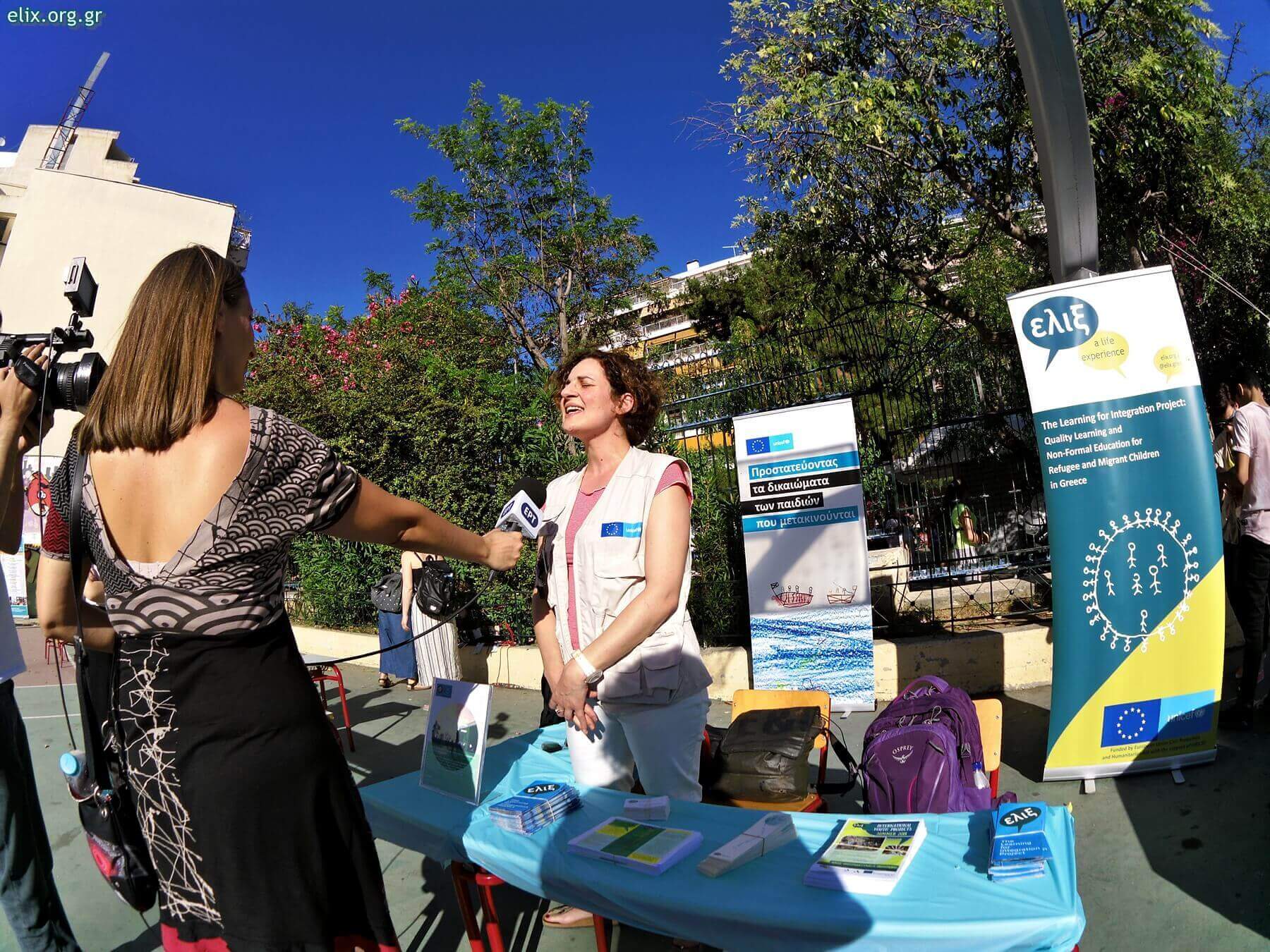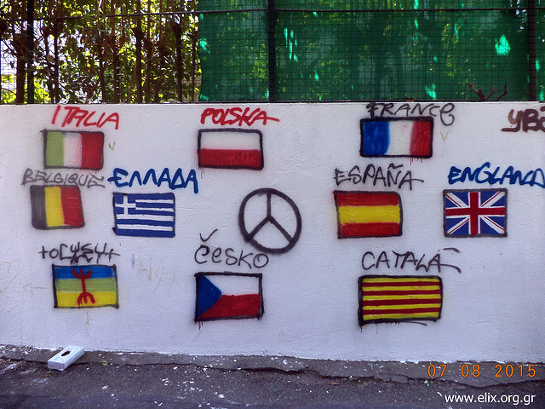Η Isabel ήταν μια από τις εθελόντριες της ομάδας Refugees Support Platform (PAR – Plataforma de Apoio aos Refugiados) από την Πορτογαλία οι οποίοι υποστήριξαν καθημερινά την υλοποίηση του προγράμματος της ΕΛΙΞ “πάμε Σχολείο!” στο 87ο Δημοτικό σχολείο του δήμου Αθηναίων, ενός προγράμματος δημιουργικής απασχόλησης και εκπαίδευσης για παιδιά από την δομή φιλοξενίας προσφύγων του Ελαιώνα.
Τους ευχαριστούμε για την σημαντική τους βοήθεια στο πρόγραμμα αυτό.
Διαβάστε πως περιγράφει η Isabel την εμπειρία της:
Habibi
Posted by ISABEL FERREIRA on JULY 22, 2016
Recycling happens at the Eleonas refugee camp education project – in five hours it takes all your energy and transforms it in a fulfilled heart.
My main task in Athens has been to support the education project a local NGO ELIX is developing with approximately 100 children from Eleonas refugee camp (probably less than 10% of the children living there). Every day we pick them up and take them to a local school, where we hold Greek classes to prepare them to join the education system in September (the few ones who will get that chance) and develop thematic workshops. Mostly, we entertain them outside of the plate and dirt jungle they live in and offer, to many of them, an opportunity to be schooled and cared for as they haven’t been in months (years?).
Too often we hear stories of members of the family lost in the war, lost on the way, lost in front of their eyes or who have simply lost the capacity to give them affection. Although these stories hit us hard, what strikes me the most in these children is how they are so…
…well educated and willing to learn
Having worked with unprivileged children before, I wouldn’t be surprised if these children were forced to prioritize survival techniques over hygiene habits. Naturally, this still holds true in many cases but I find it amazing how no child forgets to wash their hands after going to the toilet, how they put the trash on the can, many girls’ hairs are beautifully combed in a braid, and they are more careful about sharing bottles of water than me. Their care for the family is also remarkable, the elder child never takes an eye out of the younger siblings, they mind for each other’s interests and are impressively cohesive.
Mai wasn’t comfortable with us making her sit on the room floor to watch a movie like everyone else because her pants would get dirty. I thought maybe she had strict rules from home and offered my “volunteer jacket” for her to sit on. At the end, she gives it back to me with a shy smile in her face and a deep stare into my eyes as if she would say something if only we spoke the same language. I ask her “Thank you?”; her eyes shine, she gives me the hugest smile and jumps to my lap to hug me. I guess that’s the word she was looking for and it made me equally thankful for having such example of gratitude in front of me.
Speaking of communication issues, that 40% of these children speak Arabic, 60% Farsi, the teachers Greek and myself English makes things much harder (try to think of an activity you can explain and play without words to a bunch of 5 year-olds!!) but not impossible. There is a family of 7 Somali kids in the camp, of which 3 attend the school. They’ve been in Greece for 2 years now and before in Turkey for only God knows how long (Turkish is their native language). But what’s inspiring is how they don’t miss one day at school, like to interact with all the adults, win math charades and have a perfect handwriting with barely having sat in formal school ever in their lives. Every kid got a nice nametag with his class and name but the eldest sibling on day 2 comes to school with a different hand-made card saying “Interpreter” and a set of languages. “What happened to your card?” – I asked. “Isa, I have this one because I want to help you. I can translate what the others say, I know 6 languages”. Since then I got to have a new translator but also to wonder how far these kids would go if only they were given a chance to grow in a healthier environment.
…strong but needy
Preventing every 5 seconds the small ones from climbing windows, balconies, trees, shelves, grabbing bottles of water to pour on each other’s head, grabbing each other’s hair or necks is an important part of my job (together with jumping, crawling, making them sing, dance, play and laugh). Most of my energy, combed hair and white clothes stop existing in the first 30 minutes of school and the rest goes with the middle ones grabbing me, girls pushing to braid my hair, fighting for my hand to walk around the playground, shoulders to sit on or chicks to kiss over and over again. And the truth is that, the more I had, the more I would be willing to give.
This school serves exactly the purpose of giving these children a free environment to be creative, explore, make friends and learn. Racism (Afghan-Syrian clashes are big), offenses like “Shut up, you don’t have mother or father!”, denial of caresses and difficulty to sit down on a chair still exist widely, but incredibly less than only two weeks ago – and that is fascinating to me!
This week, for instance, we decided that the most challenging kid in class (that can’t be sat, hugged or talked to without screaming, tearing apart everyone’s drawings, hitting, crying or dragging himself on the floor) needed someone to be with him 100% of the time. To give him extra attention, to teach him how to hold a pen and behave in a classroom, and to hug him until he feels how much better it is to be loved than hated. We then learned he saw his brother die not that long ago, he was abandoned by his mother, spends the day alone in the camp while his father goes to work and seems to be blamed by everyone on anything bad that happens to the other kids. We’ve also learned that one week after school started he has voluntarily grabbed his father’s hand for the first time EVER. He is 6 years old and I wonder what would (will?) him and the thousands of kids like him grow up to be.
…and absolutely adorable!
Sidra is a Syrian 10 year-old. In the first day of school, the Arabic-speaking community was convinced not to participate but Sidra stood tall, she pulled my shirt and said “Madrasa”. I loved her courage to be the only Arabic-speaker and promised to protect and accompany her that day in return.
Sidra speaks 4 words of English (good, yes, no and like) and I speak two Moleskine pages of Arabic but we became best friends. We communicate with gestures, drawings and the few words we know in common. Sometimes she gets excited with the conversation (like when I drew a family and used it to talk about our families), forgets all the barriers that pull us apart and starts talking to me with long and fast Arabic sentences as if she couldn’t accept we don’t speak the same language. I shrug my shoulders, smile, hug her and take her out to play – we don’t need to talk anyways.
She jumps to my lap and grabs my hands all day, every single day, but on day 3 she covered my eyes, sat me down on a bench and offered me an old jewelry carton box held together with a bow she made. Had a necklace of hers inside and she puts it on me, looks at me and says “Habibi” (sweet or sweetheart in Arabic). Day 4 I reused the box to give her a beats bracelet she has been using since then and learned she knows three more words in English: “I love you”.
Sidra is fortunately flying out this Sunday to Norway where she and her sick mother will be reunited with her father and siblings. It’s amazing news, she talks about it every day but I will miss my Habibi (which now became 70% of the words we say because my glossary only covers meet&greet expressions). A couple of days ago she called an older Arabic-speaking girl to translate “telephone” to me. 10 minutes of gestures later I got that she wanted my number on a piece of paper, so now I get emojis and “Habibi” in voice notes over Whatsapp too. Maybe one day she will learn English to tell me how her new life is and we might see each other again somewhere in Europe.
In a nutshell, I see the power of education making miracles every single day here. Together with knowing that half of the refugees are children, it increases even more my sense of urgency towards these people. The opportunity cost of having these refugees stuck here is too high to be human.
(Resource)
















